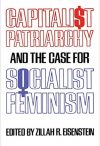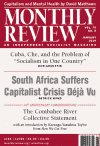Marxism

Following two key themes in Karl Marx’s thought—estrangement and political economy, in their relation to human self-knowledge—labor mediates the social metabolism. In this schema, organic (or functional) metabolism is distinguished from extended metabolism (or social organization). Socially extended metabolism gives rise to shared values and concepts in the same way that organic metabolism gives rise to life. On this basis, I suggest that both the subject and object of human self-knowledge is a socially extended self, which can connect to itself only when humans freely participate in socially extended metabolism—that is, economy, science, and industry. Estrangement, in contrast, is seen to result from a disruption within socially extended metabolism. | more…

Less than two decades into the twenty-first century, it is evident that capitalism has failed as a social system. The world is mired in economic stagnation, financialization, and the most extreme inequality in human history, accompanied by mass unemployment and underemployment, precariousness, poverty, hunger, wasted output and lives, and what at this point can only be called a planetary ecological “death spiral.” Many of the symptoms of the failure of capitalism are well-known. Nevertheless, they are often attributed not to capitalism as a system, but simply to neoliberalism, viewed as a particular paradigm of capitalist development that can be replaced by another, better one. A critical-historical analysis of neoliberalism is therefore crucial both to grounding our understanding of capitalism today and uncovering the reason why all alternatives to neoliberalism and its capitalist absolutism are closed within the system itself. | more…

Fourteen provocative papers on the oppression of women in capitalist countries, along with three articles on the subordinate position of women in two communist countries, Cuba and China. These important, often path-breaking articles are arranged in five basic sections, the titles of which indicate the broad range of issues being considered: Introduction; motherhood, reproduction, and male supremacy; socialist feminist historical analysis; patriarchy in revolutionary society; socialist feminism in the United States. The underlying thrust of the book is toward integrating the central ideas of radical feminist thought with those pivotal for Marxist or socialist class analysis. | more…

In this issue we commemorate the fortieth anniversary of the publishing of the definitive version of The Combahee River Collective Statement in Zillah Eisenstein, ed., Capitalist Patriarchy and the Case for Socialist Feminism. We are also extremely pleased to announce Monthly Review Press author Kohei Saito has won the prestigious Deutscher prize for 2018 for his Karl Marx’s Ecosocialism: Capital, Nature, and the Unfinished Critique of Political Economy. There is no doubt that this book constitutes one of the great works of Marxian theory in our time. | more…

This reprint of Keeanga-Yamahtta Taylor’s introduction to How We Get Free—Black Feminism and the Combahee River Collective serves as an introduction to both the Combahee River Collective and their seminal statement on black feminism. | more…

The most general statement of our politics at the present time would be that we are actively committed to struggling against racial, sexual, heterosexual, and class oppression and see as our particular task the development of integrated analysis and practice based upon the fact that the major systems of oppression are interlocking. The synthesis of these oppressions creates the conditions of our lives. | more…

Most people in the United States have been trained to recognize fascism in movements such as Germany’s Third Reich or Italy’s National Fascist Party, where charismatic demagogues manipulate incensed, vengeful masses. We rarely think of fascism as linked to the essence of monopoly-finance capitalism, operating under the guise of American free-enterprise. But, as Michael Joseph Roberto argues, this is exactly where fascism’s embryonic forms began gestating in the United States, during the so-called prosperous 1920s and the Great Depression of the following decade. | more…

An original poem by award-winning writer Wilderness Sarchild. | more…

“Mythologies,” writes veteran human rights lawyer Michael Tigar, “are structures of words and images that portray people, institutions, and events in ways that mask an underlying reality.” For instance, the “Justice Department” appears, by its very nature and practice, to appropriate “justice” as the exclusive property of the federal government. In his brilliantly acerbic collection of essays, Tigar reveals, deconstructs, and eviscerates mythologies surrounding the U.S. criminal justice system, racism, free expression, workers’ rights, and international human rights. | more…

In this excerpt from The Accumulation of Capital, Rosa Luxemburg explains how classical political economy lacks a clear conception of the commodity—both in the terms of the distinctions between use value and exchange value, as well as between concrete and abstract labor. This metaphysical, essentialist framework leads to a complete failure to understand the social character of labor’s capacity to create value. | more…

One of the horrors of the capitalist system is that slave labor, which was central to the formation and growth of capitalism itself, is still fully able to coexist alongside wage labor. But, as Karl Marx pointed out, it is the fact of being paid for one’s work that validates capitalism as a viable socio-economic structure. Beneath this veil of “free commerce”—where workers are paid only for a portion of their workday, and buyers and sellers in the marketplace face each other as “equals”—lies a foundation of immense inequality. Yet workers have always rebelled. They’ve organized unions, struck, picketed, boycotted, formed political organizations and parties—sometimes they have actually won and improved their lives. In his timely and innovative book, Michael D. Yates asks if the working class can, indeed, change the world. | more…

In the last piece he wrote before his passing, Samir Amin revisits, for our age, the most important revolutionary document of all time, the Communist Manifesto. In a fitting conclusion to the work of a great revolutionary intellectual, Amin seeks nothing less than to explain the changing world trajectory from 1848 to 2018. Against the persistent vision of the globalized development of capitalism, he puts forward a vision for the transformation of the world through revolutionary processes—breaking with the submission to the deadly vicissitudes of the decadence of civilization.











